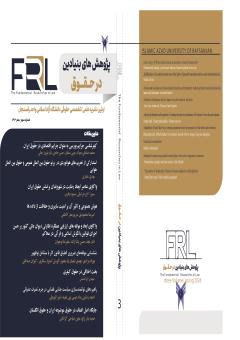Analyzing the dimensions and components of evaluating the supervisory performance of the Supreme Court on the good implementation of laws with an Islamic and Quranic perspective in the courts.
Subject Areas :Nader Najd 1 , Hassan Pashazadeh 2 * , Alireza Nojavan 3
1 - Department of Private Law, Tabriz Branch, Islamic Azad University, Tabriz, Iran.
2 - Department of Private Law, Tabriz Branch, Islamic Azad University, Tabriz, Iran.
3 - Department of Private Law, Tabriz Branch, Islamic Azad University, Tabriz, Iran.
Keywords: Supreme Court, law enforcement, regulatory role, court decisions, judicial reviews,
Abstract :
The Supreme Court of Iran is the highest judicial authority in Iran, which was formed in order to monitor the correct implementation of laws in the courts and to establish the unity of the judicial procedure assigned to it according to the law, based on the criteria determined by the head of the judiciary. According to Article 3 of the Law on Determining the Appeals of Court Judgments and the Procedure for Handling them, approved in October 1367, the Supreme Court is the authority for reviewing, violating or upholding the judgments of the First Criminal Court, the First Legal Court, and the Special Civil Court and the Revolutionary Court. Proceedings in the branches of the Supreme Court of Iran are formal, and after examining the case and the court verdict and comparing the cases with the law, if the Supreme Court judges the verdict to be correct and in accordance with the law and Shariah standards, it approves it and the judicial proceedings are terminated. Finds. The findings of this article in the review of the court's supervisory performance show that according to Article 392 of the Civil Procedure Law, this court, while examining the judicial case, if it observes a violation by the judges of the case, it must apply the law and this issue requires judicial and disciplinary supervision. Because separate disciplinary and judicial supervision does not make sense because it leads to the delay of proceedings and abuse of persons. On the other hand, the court does not have the unity of supervision due to the multiplicity of supervisory authorities; Therefore, the Supreme Court should exercise its supervision comprehensively and centrally.
1. Abrishmi Rad, Mohammad Amin; Aineh Nagini, Hossein, 2018, the comparison of the position and competences of the Supreme Court and the Court of Administrative Justice, New Administrative Law Research Quarterly, Year 1, Number 1, Winter (in Persian(
2. Ahmadi, Nemat, 1385, legal supervision of court decisions, Hafez Monthly, No. 30, first half of July (in Persian(
3. Ismaili, Hamidreza, 1400, the rights and duties of litigants in the first hearing, the second international research conference in engineering, science and technology, March. (in Persian(
4. Omidi, Jalil, 2019, The Supreme Court's responsibility in systematizing the interpretation of criminal laws, Criminal Law and Criminology Quarterly, Volume 50, Number 1, Spring and Summer (in Persian(
5. Bahrami, Bahram, 1386, the principles of retrial, Tehran, Negah Bineh Publications (in Persian(
6. Jar, Khalil, 1376, Laros Persian Arabic Comprehensive Dictionary, translated by Seyyed Hamid, Tabibian, Tehran, Amir Kabir Publications, vol. 2, ch. 2. (in Persian(
7. Davodi, Mohammad Javad, 2013, The Supreme Court's Supervisory Jurisdiction in Iranian Law and French Law, Doctoral Dissertation, Faculty of Education and Law, to the guidance teacher: Dr. Alireza Azarbaijani (in Persian(
8. Dehkhoda, Ali Akbar, 1373, Dehkhoda Dictionary, Tehran, University of Tehran Publishing and Printing Institute, Chapter 1 of the New Period, Spring (in Persian(
9. Rasakh, Mohammad, 1390, Supervision and balance in the constitutional rights system, Tehran, Darak Publishing House, Ch 1. (in Persian(
10. Zareem, Abbas, 2014, Criminal Procedure Code, Tehran, Mizan Publications (in Persian(
11. Shafii Sardasht, Jafar; Gurji Azandriani, Ali Akbar; Fazlinejad, Javad, 2017, a conceptual overview of supervision in Iran's legal system, Administrative Law Quarterly, Year 6, Number 16, Autumn. (in Persian(
12. Shams, Abdullah, 1387, civil procedure of the advanced period, second volume, Tehran, Darak Publications, vol. 2, ch. 17.
13. Sadrzadeh Afshar, Seyed Mohsen, 1373, Civil and Commercial Procedures, Tehran, Majed University Jihad Publishing House, Vol. 1, Ch. 1 (in Persian(
14. Abedian, Mirhossein, 1387, Supreme Court of the country and supervision of the good implementation of laws, Legal Journal of Justice, No. 26, Spring 1387 Alami, Shamsuddin, 1354, Appellate proceedings and the need to change the procedure of the Supreme Court of the country, Legal Journal of the Ministry of Justice, No. 8 and 9, Khordad (in Persian(
15. Katouzian, Nasser, 2013, Introduction to the science of law and the study of the legal system of Iran, Tehran, Publishing Co., Ch. 38. (in Persian(
16. Gurji Azandriani, Ali Akbar, 2013, Monitoring the implementation of the Constitution: individual or institutional justice? Exclusive or network monitoring? Proceedings of the First National Conference of the Executive Power on the Fundamental Rights of the Islamic Republic of Iran, Tehran, Vice President of Legal Affairs of the Presidency for Compilation, Revision and Publication of Laws and Regulations. (in Persian(
17. Matin Daftari, Ahmad, 2017, from the State Council to the Administrative Court, Basic Rights Journal, year 7, number 9 (in Persian(
18. Mohajeri, Ali, 1387, Expanded on Civil Procedure, third volume, Fakhr Sazan Publications, first edition, Tehran, (in Persian(
19. Nahrini, Fereydoun, 2016, Evidence and Procedure, Tehran, Ganj Danesh Publications (in Persian(
20. Hormazi, Khalil Elah, 2013, appeals from civil decisions and the supervisory role of the Supreme Court of the country in the correct implementation of laws, Tehran University doctoral thesis (in Persian(
21. Hormazi, Khairale; Babaei Qara Feshlaghi, Habib, 2016, the competent authority to deal with the third party's objection to the decision and the third party's executive objection (with an emphasis on Iran's judicial procedure(, Private Law Studies Quarterly, Volume 47, Number 4, Winter. (in Persian(
22. Vahedi, Qadratullah, 1383, Civil Procedure Rules, Tehran, Mizan Publishing House, Ch 4. (in Persian(

